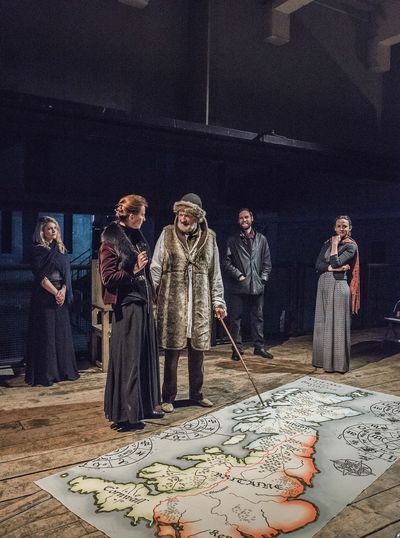King Lear at The Rose Playhouse
By ROZ DINEEN
John McEnery as King Lear
The Rose was the first purpose-built theatre in Southwark. Before The Globe, before, even, The Swan, The Rose stood among the bear-baiting, whore-housing, dens and iniquities. Doctor Faustus was staged there, as were both the Henry VIs and Kyd’s Spanish Tragedy. By 1606 the space had been abandoned, it was repurposed, built over and then lay undiscovered until the late 1980s when an office block came down above it.
Our offices being located where they are (sort of on top of the huge and morphing London Bridge station), the Rose is our local theatre and has been well-frequented by TLS staff. It is still an archaeological site, a big hole, an excavation, partly unroofed. A viewing platform has been installed – like Juliet’s balcony – over the damp concrete scene. It is quite remarkable that on this platform (not even a wooden O) it is just about possible to fit fifty seats and a production, let alone an impressive and moving staging of King Lear. The Malachites company, here directed by Benjamin Blyth, have done exactly this.
The benefits of an intimate Lear are in evidence from the start. The King (John McEnery) holds court to carve up his kingdom for his daughters and “unburden'd crawl toward death”. It’s a scene that has been known to invite over-acting, but here there is no eye-rolling, there are no meaningful looks; with the audience in such close proximity, everything can be under-played, the daughters’ slightest smirks and hesitations are detectable. Goneril, Reagan and Cordelia (respectively Claire Dyson, Orla Jackson and Emma Kirrage) are smart, subtle and individuated. Lear would give the most opulent third to his youngest, Cordelia, but first she has to play his game, she must delight him with some ornate language. Cordelia offers “nothing”.
The play’s sub-plot of Edgar (Ludovic Hughes) and Edmund (William De Coverly), the legitimate and illegitimate sons of the Earl of Gloucester (Brian Merry), is not so much a sub-plot in this production: the three actors in this triangle alone could hold the attention for the ninety-minute running time (yes, ninety minutes, no heating and no toilets means no interval and cuts; but the play has been gently shrunk, rather than butchered, even if the war does come on at a bit of a gallop). The music (original compositions by Dr Deborah Pritchard and Danielle Larose) emanates throughout from “off stage”, which is a small corner of the excavation, just visible. From this corner the great storm that will crack Lear’s mind begins to grow, in voice and instrument.
During the storm, the whole excavated space is brought into play as Lear, his Fool (Samuel Clifford), Kent (David Vaughan Knight) and Edgar (hiding under the cover of madness), each unnaturally thrown out of his society, leave the platform and meet in the wild, at the back of the dug-out waterlogged old theatre. From here they are at liberty to scream against the wind and really move. But out of the elements and back on the platform, we see a perfectly under-played Fool who is usurped by Edgar and devastated for Lear. We also witness McEnery conveying the madness of an old man up close, which here is frightening, as it should be.
It is hoped that in 2016 the excavation at the Rose site will be finished, and eventually a 250-seat theatre will take up the space. I’d go now, before the crowds get there, while it is still uncovered.
King Lear runs at The Rose Playhouse until April 30.
Peter Stothard's Blog
- Peter Stothard's profile
- 30 followers





